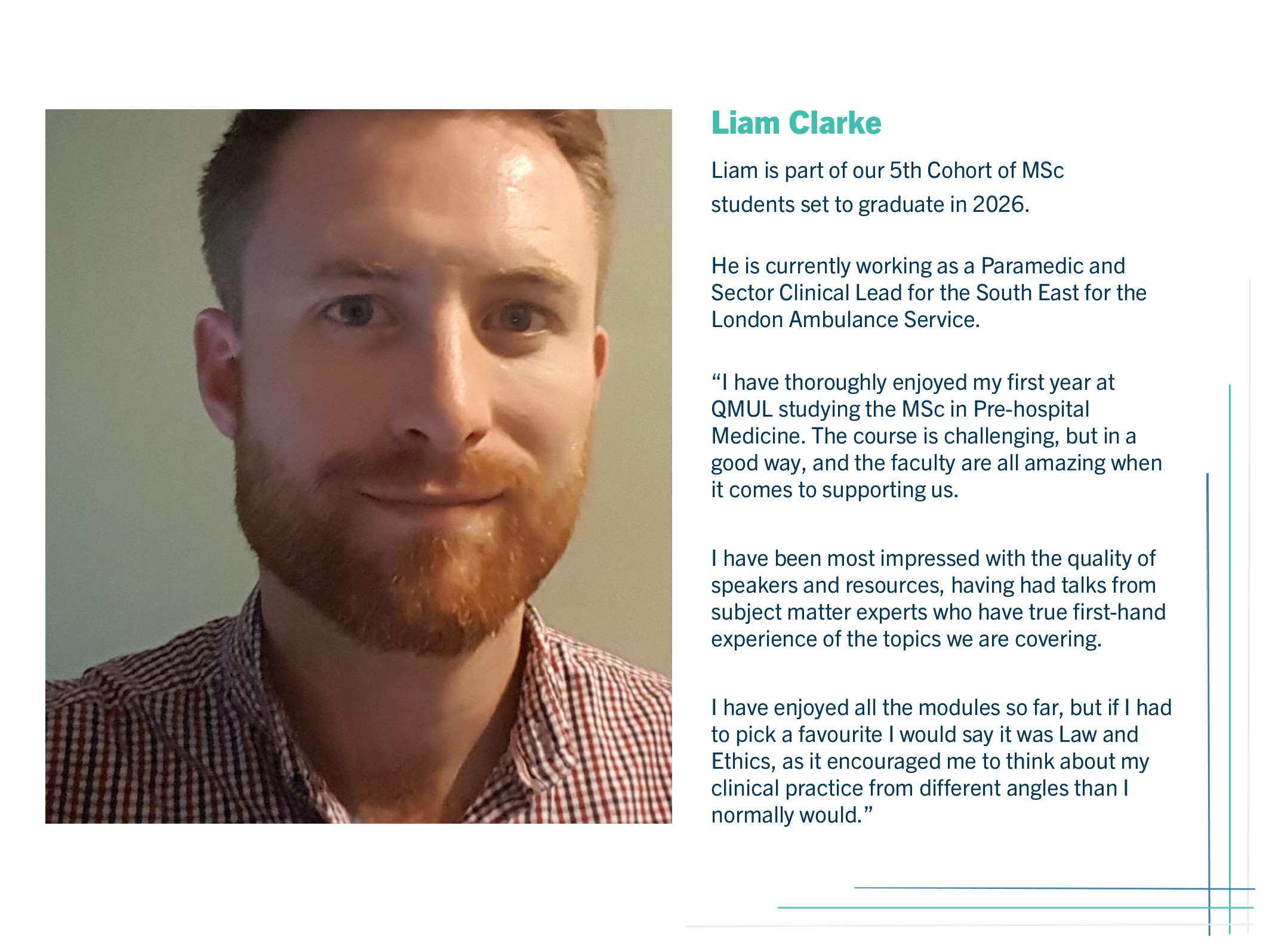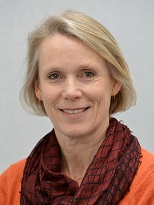Study options
- Starting in
- September 2025
- Location
- Whitechapel
- Fees
- Home: £6,450
Overseas: £12,750
EU/EEA/Swiss students
The course fee is charged per annum for 2 years. Note that fees may be subject to an increase on an annual basis - see details on our tuition fees page.
What you'll study
Prehospital medicine is an interdisciplinary field dedicated to the treatment of injury and illness outside hospital, and in particular, working to manage the time-critical reversible aspects of physiological processes activated when the human body suffers significant clinical insult.
This innovative programme follows the hugely successful iBSc in Prehospital Medicine delivered at Queen Mary University of London's Faculty of Medicine and Dentistry, an internationally renowned institution. The MSc brings together key areas of theory and practice necessary for advanced practitioners. You’ll combine concepts, materials and practice to form the technical and non-technical basis for praxis.
You’ll learn key skills and specific practitioner attributes including high quality interprofessional working, incident and scene management and human factors. Modules are synergistic and together form a basis for an exciting masters programme. For example, a focus on human factors, simulation and performance is joined with modules exploring cutting-edge science, so that you receive a holistic and realistic medical education.
The programme is run in partnership with the Institute of Prehospital Care (IoPHC) at London’s Air Ambulance, a world leader in the field of pre-hospital medicine. Through its research, innovation and education activities, the Institute has influenced clinical guidelines, governance standards, and the practice of air ambulances in the UK, Europe and Australia.
Structure
- Six compulsory modules
- Compulsory 10,000-word dissertation
- Face-to-face learning pods, held in London, for each module
Compulsory/Core modules
Students will complete a 10,000 word dissertation on an element of prehospital medicine. Subject matter could be related to the module content across the related course content, or be independent of this. Dissertations will allow students to develop and demonstrate a detailed understanding of a specific subject as applied to prehospital medicine.
This module has two broad headings, recreational drug pharmaco-toxicology and chemical/biological agent toxicology. Students will study the clinical syndromes and the underpinning basic science principles of drug actions as well as the basis of the management for patients in this phase of care. The module will enable students to understand the mechanism of action of antidotes that are used in the prehospital phase and will provide the clinician with a scientific background to the toxidromes and the diverse set of presentations that exist in the context of recreational drug pharmacology and toxicology. The module will also cover the pharmacology and clinical syndromes associated with 'deliberate-release' chemical and biological warfare agents - including traditional and more modern agents - and will develop a pragmatic approach to the identification and management of these.
This module offers the opportunity for students to develop and deepen their knowledge and skills in the discipline of resuscitation science. The module covers some of the latest developments in the field, such as prehospital extra-corporeal life support and cardiac arrest and peri-cardiac arrest science. Alongside this, students will review the latest organisational responses to patient need - for example, cardiac arrest centres and advanced prehospital resuscitation teams. The module aims not only prepares students for their practice-based work, embracing current and future innovation, it also allows them to gain broader understanding of the critical decision making in developing and applying new practice to the service.
Legal and ethical considerations are relevant for all clinicians, but offer particular challenge for those who practice in the prehospital field. Case management has to embrace key underpinning practice principles but within the specific contexts that apply in the prehospital phase i.e. medicine undertaken in public and generally unprotected environments and on patients not expecting medical need. The module will cover a spectrum of pertinent legal and ethical concerns and will also include new and emerging areas such as the application of ethical principles related to the filming of patients, or the use social media for educational purposes etc.
The understanding of pathology of the diseases that present in the prehospital phase is dependent on a sound knowledge of human anatomy. The interpretation of mechanisms of injury, the analysis of symptoms and signs, as well as the delivery of key diagnostic tests during the very early stages of care all rely on a clinician's application of their anatomical knowledge.
An understanding of human factors, error mitigation and performance is essential to both ensuring patient safety and excellent outcomes in prehospital medicine. The term 'crew resource management' is used as a synonym for 'human factors' in the aviation, nuclear, maritime and other organisations where optimal performance is seen as essential. In prehospital and emergency care, the performance of teams, especially those that are rapidly formed, is commonplace. Working with experts from elite sport, aviation and other related industries, the module will embrace best practice in team performance. In parallel with the performance of individual teams, it is recognised that high performance in clinical teams is supported by quality performance systems, good governance, ergonomics and team structures, all crucial to delivering optimal care to patients. Apposite education and leadership concepts are embedded within the teaching and learning discussions and practices in this module.
Simulation and moulage are a key component of education for prehospital clinicians. The module focuses on creating and developing scenarios for moulage and simulation praxis. Students will have an opportunity to further their understanding of moulage and simulation in terms of history, purpose, methods/processes, educational theory, teaching, learning, assessment and feedback. There will be opportunities for creating simulated learning experiences, and developing these in the student's work environment. Apposite education and leadership concepts are embedded within the teaching and learning discussions and practices in this module.
Assessment
- Taught module assessment includes short answer question exams, and portfolios
- Three portfolios in Law and Ethics, Simulation and Human Factors
- Three short answer question papers on applied toxicology, resuscitation science, and applied anatomy
- Your research will be assessed through a 10,000-word dissertation and oral presentation
Opportunities
The programme focuses on enabling and encouraging clinicians to reflect on their own individual practice, in your own workplace. Most of the portfolio work, case discussions and reflections incorporate your own experiences within your area of practice.
—The simplest review that I can offer is that I have come to immensely look forwards to my visits to London for our teaching pods, and begrudgingly even enjoy our written assignments. The pods are an incredible opportunity to meet peers and subject matter experts. We hear and exchange ideas, and gain unique clinical, theoretical, and non-technical understanding at the very cutting edge of the various fields. The written assignments give us structured space to develop the ideas from the pods, and we are supported to research and explore the theory which underpins our current practice and explore ideas which could form the basis of the next steps in this quickly developing field.
Beyond the cutting edge of current clinical practice, we explore the active research areas underpinning best practice in both prehospital emergency medicine and related disciplines. This programme will undoubtedly interest and greatly assist any current or prospective prehospital clinicians who want to develop their practice beyond the guidelines and protocols and position themselves as future leaders in the field.
Dr Adam Collins, MSc Prehospital Medicine student
Teaching
The course will utilise Queen Mary’s lecture rooms, indoor and outdoor spaces, and be supported by our virtual learning environment, QMPlus. This enables lecture notes and handout material to be available electronically, with potential for discussion and question boards. The face-to-face learning pods are advertised well in advance of the programme start, so that applicants can manage their diaries, request leave from their duties, and plan their time.
We will be running teaching pods for each of the modules, these being between three to five days in duration. In the first year there are 4 x 15 credit modules, which means there will be pods running roughly every six weeks. Students are required to attend in person. Work on the dissertation (60 credits) will commence from December/January in the first year and runs through both the years of the programme. We offer an indicative timetable to help plan your study time.
In the second year there are 2 x 30 credit modules, with their concomitant teaching pods at roughly half academic year intervals. The dissertation continues through the second year and culminates with hand in at the end of August of the second year. Teaching and support sessions for the dissertation will be primarily conducted online.
The direction of individual study will be guided by the formal study sessions attended - along with the overview offered by the reading lists and also the assignments and tutorials. You will take an active role in your own learning, by reading widely, reflecting on and developing, and expanding, your knowledge, understanding and critical abilities.
You will gain new technical skills and a depth of knowledge relevant to your topic. You may also have the opportunity to develop research and transferable skills, such as data analysis, presentation skills, and medical writing.
Where you'll learn
Facilities
- Queen Mary’s comprehensive libraries, including the Postgraduate Reading Room
- The book collections within the Queen Mary library system and a range of medical and clinical education journals
- Other university libraries in the London through the SCONUL scheme
- You will also be based with the Institute of Prehospital Care and will use London’s Air Ambulance training facilities
Campus
Your postgraduate learning experience is enhanced by our fantastic location in Whitechapel, in east London. Not only are we in one of the capital’s most vibrant areas to live and work but we also serve a diverse local community, with 92 different languages spoken by the borough’s 300,000 residents.
About the Institute
Institute of Health Sciences Education
The programme is taught at the Institute of Health Sciences Education (IHSE). The IHSE has a long history in medical and clinical education. In addition to a wealth of advanced courses, it conducts medical education research and evaluations, and leads quality assurance processes.
The Institute is part of the Faculty of Medicine and Dentistry – a leading UK medical and dental school and major faculty of Queen Mary University of London, which is at the forefront of medical education and research. We continue to make a real impact on health-related challenges for the benefit of local and global populations while providing the best in modern medical training. Our academics are leaders in their respective fields committed to sharing their expertise with aspiring clinicians and health professionals.
Career paths

.png)
This part-time MSc in Prehospital Medicine is for doctors, nurses and paramedics who wish to gain an advanced knowledge in prehospital medicine.
.jpg)
.jpg)
.jpg)
.jpg)
- 100% of Institute postgraduate taught graduates are in highly skilled work or graduate study (2020/21)
—When deciding to enrol onto an MSc programme, I was searching for an MSc which focused on paramedic practice and specifically applied to prehospital medicine. This MSc provides you with in depth knowledge you need for prehospital practice and to advance as a clinician.
All the content and modules have been created, designed, and taught by subject matter experts, giving you the opportunity to learn, grow, and improve in your practice whilst benefitting from their extensive knowledge and support. The faculty will go above and beyond to ensure you understand the information that has been taught and support you in exploring and researching the theories which underpin current practice.
The modules are developed in line with current practice and further delves into the future cutting edge developments in prehospital practice, focusing throughout on how as medical professionals we can improve patient care and become experts within our field. The course is fantastic and has significantly increased my knowledge and practice. Anyone who enrols in the Prehospital Medicine MSc programme will not be disappointed.
Jonathan Locke, MSc Prehospital Medicine
Fees and funding
Part-time study
September 2025 | 2 years
- Home: £6,450
- Overseas: £12,750
EU/EEA/Swiss students
Unconditional deposit
Home: Not applicable
Overseas: £2000
Information about deposits
Queen Mary alumni can get a £1000, 10% or 20% discount on their fees depending on the programme of study. Find out more about the Alumni Loyalty Award
Funding
There are a number of ways you can fund your postgraduate degree.
- Scholarships and bursaries
- Postgraduate loans (UK students)
- Country-specific scholarships for international students
Our Advice and Counselling service offers specialist support on financial issues, which you can access as soon as you apply for a place at Queen Mary. Before you apply, you can access our funding guides and advice on managing your money:
Entry requirements
UK
Degree requirements
Doctors must have an MBBS degree and a minimum of 3 years experience post-registration.
Other routes
Paramedics must have a first degree in Paramedic Practice at 2:2 or above, be registered with the Health Professions Council and have a minimum of 3 years experience.
Nurses must have a first degree in Nursing at 2:2 or above, be registered with the Nursing and Midwifery Council and practicing for a minimum of 3 years.
Paramedics and nurses without a first degree will be considered under exceptional circumstances provided there is evidence of substantial experience in the prehospital field.
Additional information
Please note: We will share the application details you submit to Queen Mary with the Institute of Pre-hospital Care at London’s Air Ambulance because it will be necessary for the performance of any contract between you and QMUL/ Institute of Pre-hospital Care at London’s Air Ambulance. Please refer to the privacy notice for applicants on our Data Protection webpages for further information.
Find out more about how to apply for our postgraduate taught courses.
International
English language requirements
The English language requirements for our programmes are indicated by English bands, and therefore the specific test and score acceptable is based on the band assigned to the academic department within which your chosen course of study is administered. Note that for some academic departments there are programmes with non-standard English language requirements.
The English Language requirements for entry to postgraduate taught and research programmes in the Institute of Health Sciences Education falls within the following English band:
Band 4: IELTS (Academic) minimum score 6.5 overall with 6.0 in each of Writing, Listening, Reading and Speaking
We accept a range of English tests and qualifications categorised in our English bands for you to demonstrate your level of English Language proficiency. See all accepted English tests that we deem equivalent to these IELTS scores.
Visas and immigration
Find out how to apply for a student visa.






-staff-photo.png)